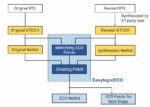Signal Integrity (SI) and Power Integrity (PI) issues are critical to analyze, ensuring the proper operation of PCB systems and IC packages, yet the computational demands from EDA tools can cause engineers to only analyze what they deem are critical signals, instead of the entire system. Cadence has managed to overcome this SI/PI… Read More
Author: Daniel Payne
SI and PI Update from Cadence on Sigrity X
Smarter, Faster LVS using Calibre nmLVS Recon
Back in the 1970s we did Layout Versus Schematic (LVS) checks manually, so when internal EDA tools arrived in the 1980s it was a huge time saver to use LVS in finding the differences between layout and schematics. One premise before running LVS is that both layout and schematics are complete and ready for comparisons. Fast forward… Read More
Accellera and PSS 3.0 at #61DAC
Accellera invited me to attend their #61DAC panel discussion about the new Portable Stimulus Standard (PSS) v3.0, and the formal press release was also just announced. The big idea with PSS is to enable seamless reuse of stimulus across simulation, emulation and post-silicon debug and prototyping.
Tom Fitzpatrick from Siemens… Read More
Keysight EDA and Engineering Lifecycle Management at #61DAC
Entering the exhibit area of DAC on the first floor I was immediately faced with the Keysight EDA booth, and it was even larger than either the Synopsys or Cadence booths. They had a complete schedule of partners presenting in their theatre that included: Microsoft Azure, Riscure, Fermi Labs, BAE Systems, Alphawave, Intel Foundry,… Read More
Circuit Simulation Update from Empyrean at #61DAC
A familiar face in EDA, Greg Lebsack met with me in the Empyrean booth at DAC this year on opening day to provide an update on what’s new. I first met Greg when he was at Tanner EDA, then Mentor and Siemens EDA, so he really knows our industry quite well. The company was a Silver level sponsor of DAC this year, and Empyrean offers tools for… Read More
Aniah and Electrical Rule Checking (ERC) #61DAC
Visiting a new EDA vendor at #61DAC is always a treat, because much innovation comes from the start-up companies, instead of the established big four EDA companies. I met with Vincent Bligny, Founder and CEO of Aniah on Wednesday in their booth, to hear about what they are doing differently in EDA. Mr. Bligny has a background working… Read More
3D IC Design Ecosystem Panel at #61DAC
At #61DAC our very own Daniel Nenni from SemiWiki moderated an informative panel discussion on the topic of 3D IC Design Ecosystem. Panelists included: Deepak Kulkarni – AMD, Lalitha Immaneni – Intel Foundry, Trupti Deshpande – Qualcomm, Rob Aitken – CHIPS, Puneet Gupta – UCLA, Dragomir Milojevic – imec. Each panelist had a brief… Read More
Easy-Logic and Functional ECOs at #61DAC
I first visited Easy-Logic at DAC in 2023, so it was time to meet them again at #61DAC in San Francisco to find out what’s new this year. Steven Chen, VP Sales for North America and Asia met with me in their booth for an update briefing. Steven has been with Easy-Logic for six years now and earned an MBA from Baruch College in New York. This… Read More
Defacto Technologies and ARM, Joint SoC Flow at #61DAC
At #61DAC I stopped by the Defacto Technologies exhibit and talked with Chouki Aktouf, President and CEO, to find out what’s new in 2024. ARM and Defacto have a joint SoC design flow by using the Arm IP Explorer tool along with Defacto’s SoC compiler, which helps to quickly create your top-level RTL, IP-XACT and UPF files. This tool… Read More
AMIQ EDA Integrated Development Environment #61DAC
I stopped by the AMIQ EDA booth at DAC to get an update from Tom Anderson about their Integrated Development Environment (IDE), aimed at helping design and verification engineers save time. In my early IC design days we used either vi or emacs and were happy with having a somewhat smart text editor. With an IDE you get a whole new way … Read More




















TSMC vs Intel Foundry vs Samsung Foundry 2026